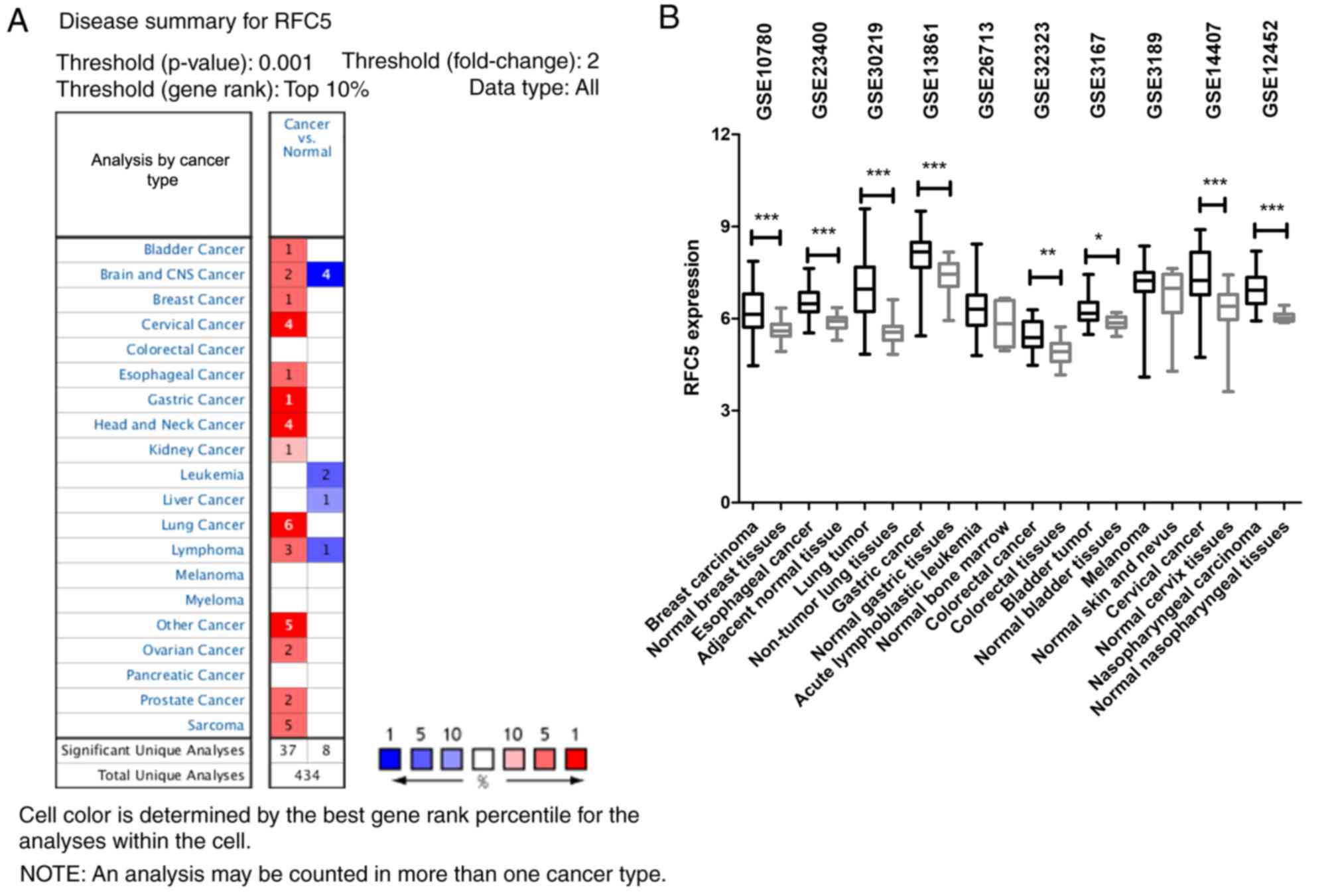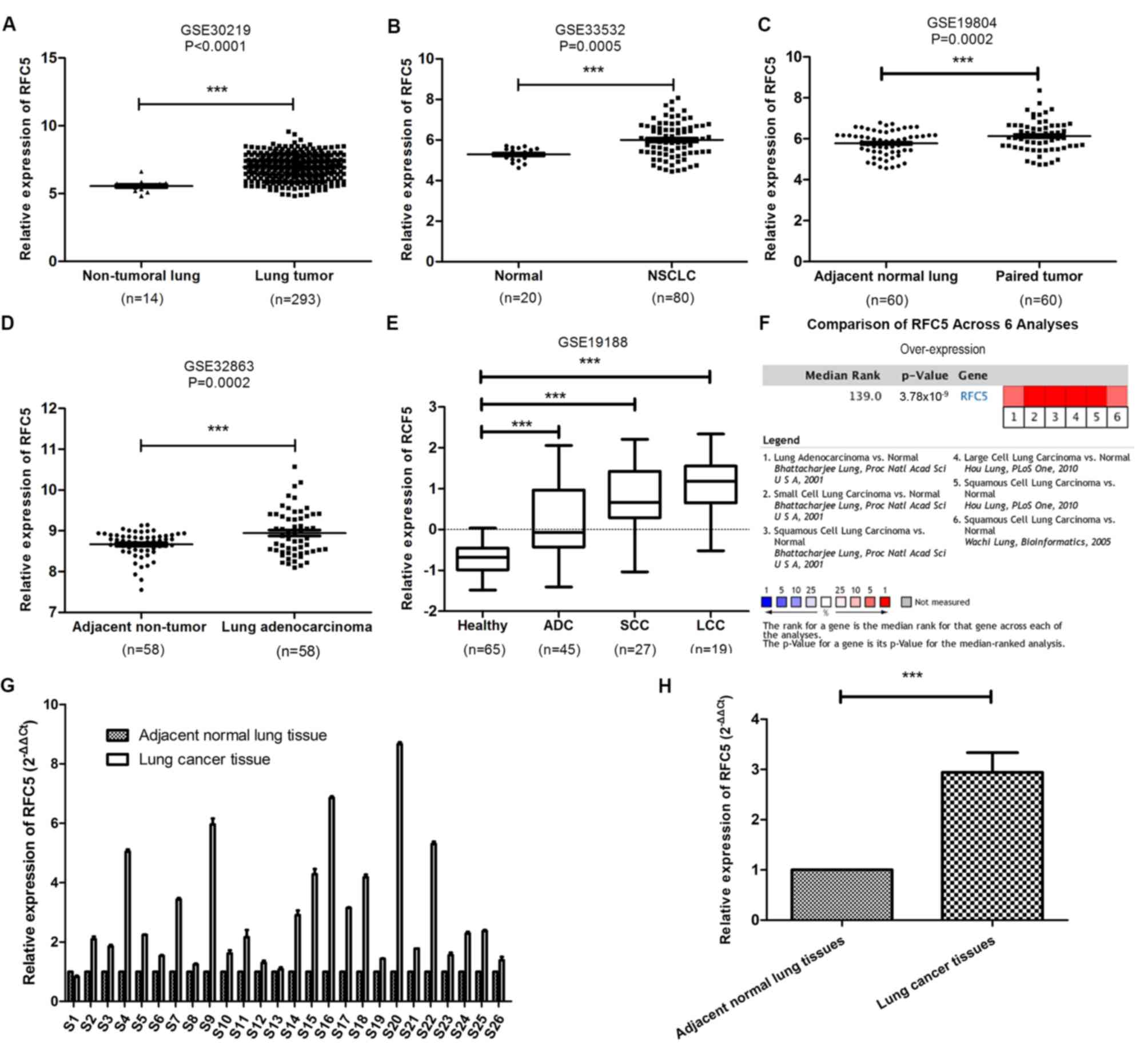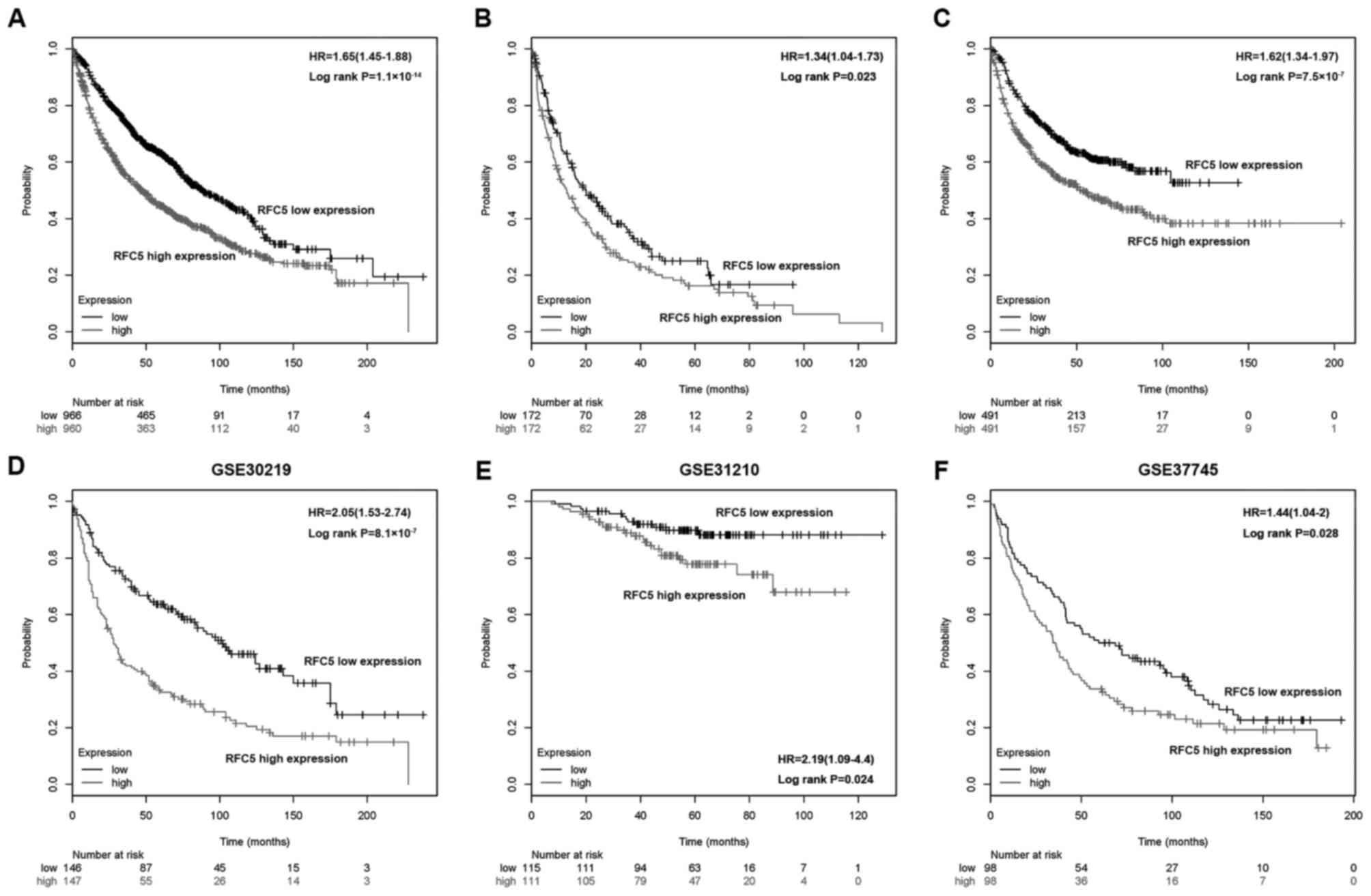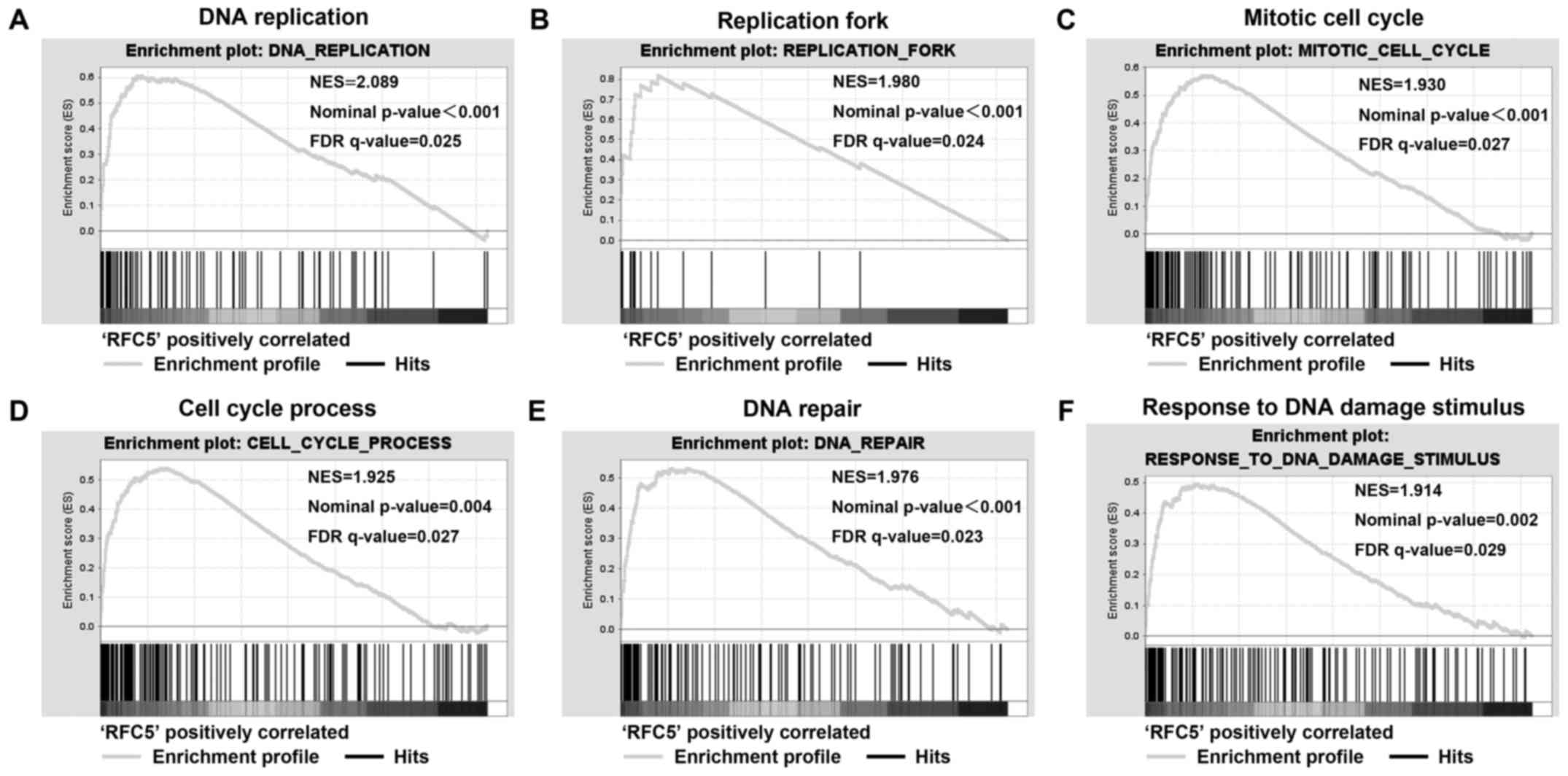|
1
|
Siegel RL, Miller KD and Jemal A: Cancer
Statistics, 2017. CA A Cancer J Clin. 67:7–30. 2017. View Article : Google Scholar
|
|
2
|
Miller KD, Siegel RL, Lin CC, Mariotto AB,
Kramer JL, Rowland JH, Stein KD, Alteri R and Jemal A: Cancer
treatment and survivorship statistics, 2016. CA Cancer J Clin.
66:271–289. 2016. View Article : Google Scholar : PubMed/NCBI
|
|
3
|
Torre LA, Siegel RL and Jemal A: Lung
Cancer Statistics. Adv Exp Med Biol. 893:1–19. 2016. View Article : Google Scholar : PubMed/NCBI
|
|
4
|
Sung WJ, Kim H and Park KK: The biological
role of epithelial-mesenchymal transition in lung cancer (Review).
Oncol Rep. 36:1199–1206. 2016. View Article : Google Scholar : PubMed/NCBI
|
|
5
|
Hanahan D and Weinberg RA: Hallmarks of
cancer: The next generation. Cell. 144:646–674. 2011. View Article : Google Scholar : PubMed/NCBI
|
|
6
|
Kato T, Yoshioka H, Okamoto I, Yokoyama A,
Hida T, Seto T, Kiura K, Massey D, Seki Y and Yamamoto N: Afatinib
versus cisplatin plus pemetrexed in Japanese patients with advanced
non-small cell lung cancer harboring activating EGFR mutations:
Subgroup analysis of LUX-Lung 3. Cancer Sci. 106:1202–1211. 2015.
View Article : Google Scholar : PubMed/NCBI
|
|
7
|
Hoshi H, Hiyama G, Ishikawa K, Inageda K,
Fujimoto J, Wakamatsu A, Togashi T, Kawamura Y, Takahashi N, Higa
A, et al: Construction of a novel cell-based assay for the
evaluation of anti-EGFR drug efficacy against EGFR mutation. Oncol
Rep. 37:66–76. 2017. View Article : Google Scholar : PubMed/NCBI
|
|
8
|
Li K, Yang M, Liang N and Li S:
Determining EGFR-TKI sensitivity of G719X and other uncommon EGFR
mutations in non-small cell lung cancer: Perplexity and solution
(Review). Oncol Rep. 37:1347–1358. 2017. View Article : Google Scholar : PubMed/NCBI
|
|
9
|
Juan O and Popat S: Crizotinib for ROS1
patients: One small step in biomarker testing, one giant leap for
advanced NSCLC patients. Lung Cancer. 104:131–133. 2017. View Article : Google Scholar : PubMed/NCBI
|
|
10
|
Chen M, Pan ZQ and Hurwitz J: Studies of
the cloned 37-kDa subunit of activator 1 (replication factor C) of
HeLa cells. Proc Natl Acad Sci USA. 89:5211–5215. 1992. View Article : Google Scholar : PubMed/NCBI
|
|
11
|
Virshup DM and Kelly TJ: Purification of
replication protein C, a cellular protein involved in the initial
stages of simian virus 40 DNA replication in vitro. Proc Natl Acad
Sci USA. 86:3584–3588. 1989. View Article : Google Scholar : PubMed/NCBI
|
|
12
|
Uhlmann F, Cai J, Flores-Rozas H, Dean FB,
Finkelstein J, O'Donnell M and Hurwitz J: In vitro reconstitution
of human replication factor C from its five subunits. Proc Natl
Acad Sci USA. 93:6521–6526. 1996. View Article : Google Scholar : PubMed/NCBI
|
|
13
|
Cullmann G, Fien K, Kobayashi R and
Stillman B: Characterization of the five replication factor C genes
of Saccharomyces cerevisiae. Mol Cell Biol. 15:4661–4671. 1995.
View Article : Google Scholar : PubMed/NCBI
|
|
14
|
Majka J and Burgers PM: The PCNA-RFC
families of DNA clamps and clamp loaders. Prog Nucleic Acid Res Mol
Biol. 78:227–260. 2004. View Article : Google Scholar : PubMed/NCBI
|
|
15
|
Zhang G, Gibbs E, Kelman Z, O'Donnell M
and Hurwitz J: Studies on the interactions between human
replication factor C and human proliferating cell nuclear antigen.
Proc Natl Acad Sci USA. 96:1869–1874. 1999. View Article : Google Scholar : PubMed/NCBI
|
|
16
|
Niu G, Wang D, Pei Y and Sun L: Systematic
identification of key genes and pathways in the development of
invasive cervical cancer. Gene. 618:28–41. 2017. View Article : Google Scholar : PubMed/NCBI
|
|
17
|
Chae HD, Mitton B, Lacayo NJ and Sakamoto
KM: Replication factor C3 is a CREB target gene that regulates cell
cycle progression through the modulation of chromatin loading of
PCNA. Leukemia. 29:1379–1389. 2015. View Article : Google Scholar : PubMed/NCBI
|
|
18
|
Xiang J, Fang L, Luo Y, Yang Z, Liao Y,
Cui J, Huang M, Yang Z, Huang Y, Fan X, et al: Levels of human
replication factor C4, a clamp loader, correlate with tumor
progression and predict the prognosis for colorectal cancer. J
Transl Med. 12:3202014. View Article : Google Scholar : PubMed/NCBI
|
|
19
|
Lockwood WW, Thu KL, Lin L, Pikor LA,
Chari R, Lam WL and Beer DG: Integrative genomics identified RFC3
as an amplified candidate oncogene in esophageal adenocarcinoma.
Clin Cancer Res. 18:1936–1946. 2012. View Article : Google Scholar : PubMed/NCBI
|
|
20
|
Arai M, Kondoh N, Imazeki N, Hada A,
Hatsuse K, Matsubara O and Yamamoto M: The knockdown of endogenous
replication factor C4 decreases the growth and enhances the
chemosensitivity of hepatocellular carcinoma cells. Liver Int.
29:55–62. 2009. View Article : Google Scholar : PubMed/NCBI
|
|
21
|
Murakami T, Takano R, Takeo S, Taniguchi
R, Ogawa K, Ohashi E and Tsurimoto T: Stable interaction between
the human proliferating cell nuclear antigen loader complex
Ctf18-replication factor C (RFC) and DNA polymerase {epsilon} is
mediated by the cohesion-specific subunits, Ctf18, Dcc1 and Ctf8. J
Biol Chem. 285:34608–34615. 2010. View Article : Google Scholar : PubMed/NCBI
|
|
22
|
Maradeo ME, Garg A and Skibbens RV: Rfc5p
regulates alternate RFC complex functions in sister chromatid
pairing reactions in budding yeast. Cell Cycle. 9:4370–4378. 2010.
View Article : Google Scholar : PubMed/NCBI
|
|
23
|
Peng WX, Han X, Zhang CL, Ge L, Du FY, Jin
J and Gong AH: FoxM1-mediated RFC5 expression promotes temozolomide
resistance. Cell Biol Toxicol. 33:527–537. 2017. View Article : Google Scholar : PubMed/NCBI
|
|
24
|
Liu SM, Chen W and Wang J: Distinguishing
between cancer cell differentiation and resistance induced by
all-trans retinoic acid using transcriptional profiles and
functional pathway analysis. Sci Rep. 4:55772014. View Article : Google Scholar : PubMed/NCBI
|
|
25
|
Klein D: Quantification using real-time
PCR technology: Applications and limitations. Trends Mol Med.
8:257–260. 2002. View Article : Google Scholar : PubMed/NCBI
|
|
26
|
Gyorffy B, Surowiak P, Budczies J and
Lanczky A: Online survival analysis software to assess the
prognostic value of biomarkers using transcriptomic data in
non-small-cell lung cancer. PLoS One. 8:e822412013. View Article : Google Scholar : PubMed/NCBI
|
|
27
|
Gyorffy B, Lanczky A, Eklund AC, Denkert
C, Budczies J, Li Q and Szallasi Z: An online survival analysis
tool to rapidly assess the effect of 22,277 genes on breast cancer
prognosis using microarray data of 1,809 patients. Breast Cancer
Res Treat. 123:725–731. 2010. View Article : Google Scholar : PubMed/NCBI
|
|
28
|
Gyorffy B, Lanczky A and Szallasi Z:
Implementing an online tool for genome-wide validation of
survival-associated biomarkers in ovarian-cancer using microarray
data from 1287 patients. Endocr Relat Cancer. 19:197–208. 2012.
View Article : Google Scholar : PubMed/NCBI
|
|
29
|
Szasz AM, Lanczky A, Nagy A, Förster S,
Hark K, Green JE, Boussioutas A, Busuttil R, Szabó A and Győrffy B:
Cross-validation of survival associated biomarkers in gastric
cancer using transcriptomic data of 1,065 patients. Oncotarget.
7:49322–49333. 2016. View Article : Google Scholar : PubMed/NCBI
|
|
30
|
Gorbea CM, Marchand P, Jiang W, Copeland
NG, Gilbert DJ, Jenkins NA and Bond JS: Cloning, expression and
chromosomal localization of the mouse meprin beta subunit. J Biol
Chem. 268:21035–21043. 1993.PubMed/NCBI
|
|
31
|
Shimada M, Okuzaki D, Tanaka S, Tougan T,
Tamai KK, Shimoda C and Nojima H: Replication factor C3 of
Schizosaccharomyces pombe, a small subunit of replication factor C
complex, plays a role in both replication and damage checkpoints.
Mol Bio Cell. 10:3991–4003. 1999. View Article : Google Scholar
|
|
32
|
Naiki T, Shimomura T, Kondo T, Matsumoto K
and Sugimoto K: Rfc5, in cooperation with rad24, controls DNA
damage checkpoints throughout the cell cycle in Saccharomyces
cerevisiae. Mol Cell Biol. 20:5888–5896. 2000. View Article : Google Scholar : PubMed/NCBI
|
|
33
|
Kim HS and Brill SJ: Rfc4 interacts with
Rpa1 and is required for both DNA replication and DNA damage
checkpoints in Saccharomyces cerevisiae. Mol Cell Biol.
21:3725–3737. 2001. View Article : Google Scholar : PubMed/NCBI
|
|
34
|
Tomida J, Masuda Y, Hiroaki H, Ishikawa T,
Song I, Tsurimoto T, Tateishi S, Shiomi T, Kamei Y, Kim J, et al:
DNA damage-induced ubiquitylation of RFC2 subunit of replication
factor C complex. J Biol Chem. 283:9071–9079. 2008. View Article : Google Scholar : PubMed/NCBI
|
|
35
|
Shiomi Y, Usukura J, Masamura Y, Takeyasu
K, Nakayama Y, Obuse C, Yoshikawa H and Tsurimoto T: ATP-dependent
structural change of the eukaryotic clamp-loader protein,
replication factor C. Proc Natl Acad Sci USA. 97:14127–14132. 2000.
View Article : Google Scholar : PubMed/NCBI
|
|
36
|
Munshi A, Cannella D, Brickner H,
Salles-Passador I, Podust V, Fotedar R and Fotedar A: Cell
cycle-dependent phosphorylation of the large subunit of replication
factor C (RF-C) leads to its dissociation from the RF-C complex. J
Biol Chem. 278:48467–48473. 2003. View Article : Google Scholar : PubMed/NCBI
|
|
37
|
Qi S, Wang CH, Li CL, Wang P and Liu MH:
Candidate genes investigation for severe nonalcoholic fatty liver
disease based on bioinformatics analysis. Medicine (Baltimore).
96:e77432017. View Article : Google Scholar : PubMed/NCBI
|
|
38
|
Arnold BN, Thomas DC, Rosen JE, Salazar
MC, Detterbeck FC, Blasberg JD, Boffa DJ and Kim AW: Effectiveness
of local therapy for stage I non-small-cell lung cancer in
nonagenarians. Surgery. 162:640–651. 2017. View Article : Google Scholar : PubMed/NCBI
|
|
39
|
Koch HB, Zhang R, Verdoodt B, Bailey A,
Zhang CD, Yates JR III, Menssen A and Hermeking H: Large-scale
identification of c-MYC-associated proteins using a combined
TAP/MudPIT approach. Cell cycle. 6:205–217. 2007. View Article : Google Scholar : PubMed/NCBI
|
|
40
|
Erdogan E, Klee EW, Thompson EA and Fields
AP: Meta-analysis of oncogenic protein kinase Ciota signaling in
lung adenocarcinoma. Clin Cancer Res. 15:1527–1533. 2009.
View Article : Google Scholar : PubMed/NCBI
|
|
41
|
Kang BY, You H, Bandyopadhyay S, Agrawal
N, Melchert RB, Basnakian AG, Liu Y and Hermonat PL: Cervical
cancer isolate PT3, super-permissive for adeno-associated virus
replication, over-expresses DNA polymerase delta, PCNA, RFC and
RPA. BMC Microbiol. 9:792009. View Article : Google Scholar : PubMed/NCBI
|
|
42
|
Narayan G, Bourdon V, Chaganti S,
Arias-Pulido H, Nandula SV, Rao PH, Gissmann L, Dürst M, Schneider
A, Pothuri B, et al: Gene dosage alterations revealed by cDNA
microarray analysis in cervical cancer: Identification of candidate
amplified and overexpressed genes. Genes chromosomes cancer.
46:373–384. 2007. View Article : Google Scholar : PubMed/NCBI
|
|
43
|
Slebos RJ, Yi Y, Ely K, Carter J, Evjen A,
Zhang X, Shyr Y, Murphy BM, Cmelak AJ and Burkey BB: Gene
expression differences associated with human papillomavirus status
in head and neck squamous cell carcinoma. Clinical cancer research:
an official journal of the American Association for Cancer
Research. 12:701–709. 2006. View Article : Google Scholar : PubMed/NCBI
|


















